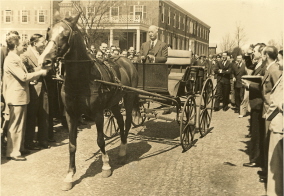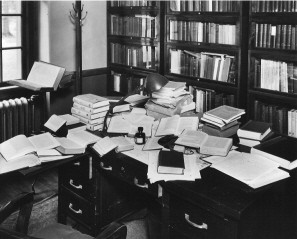Perseverance: 1928-1942
The Great Depression involved Southern in profound financial strain. In the 1930s, the spirit of America sunk into silence in the face of the Great Depression. Southern Seminary felt its full effects. Old Testament professor Dr. John Sampey, elected president in 1929, led the seminary through this difficult period.
The depression meant fewer students and lower revenues for the seminary. In addition, when Mullins purchased the new campus, Southern had assumed several million dollars worth of debt. In years to come, the Seminary community gave thanks for the initiative of Mullins and the campus his ambition secured. The burden was heavy during this era, however. With pluck and a steady hand, Sampey led the seminary as it maintained its operations and met its debt obligations in this hardest of hard times.
Sampey’s leadership style differed drastically from Mullins’s. Where Mullins’s predecessors had worked closely with other faculty members to run the school, Mullins preferred the role of chief executive. Sampey, on the other hand, soon concluded that this approach did not suit his setting. He enlisted several faculty members in the tasks of administration, calling on Gaines S. Dobbins, professor of Church Efficiency and Sunday School Pedagogy, to serve as treasurer of the Seminary. Dobbins engineered the refinancing of the seminary’s debt through Mutual Benefit Life Insurance Company of New York, an act that alleviated the Seminary’s financial strain.
During this period, the community mourned the loss of Dr. A. T. Robertson, who passed away in 1934 after suddenly growing ill. W. H. Davis took over Robertson’s chair and led the New Testament faculty. The renowned department had drawn a talented student pool that included doctoral students and future pastors Herschel Hobbs and W. A. Criswell.
The number of students attending the institution dropped from 435 in 1929 to a low point of 343 in 1933. As the depression subsided, enrollment rose as Southern drew 520 students in 1941. During this academic year, President Sampey resigned his presidential duties. He gave up his professorial work a year later later. He had carved out a legacy of service at the school, having taught Old Testament for fifty years. Sampey and his associates had rescued the Seminary from bankruptcy. By grace and perseverance, the struggle for survival was won.


